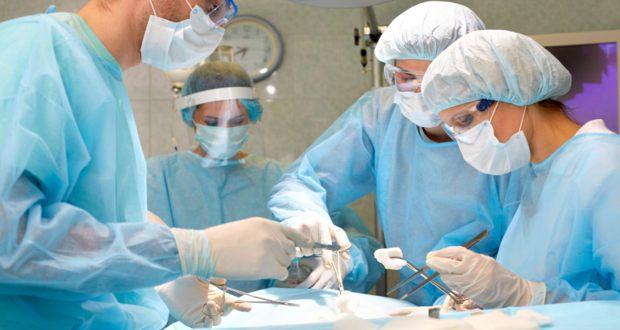Metabolic surgery for diabetes — can it really reverse the disease?
 For people with diabetes, the pain of taking a handful of medication or the jab of those frequent insulin injections, the fear of suffering from a heart attack and the constant stress of losing weight can take over their life. But what if there was a quick and easy way to get rid of the disease altogether? Well, that wish might just have become a reality. Metabolic surgery promises to reverse type 2 diabetes, and help you go back to living life to the fullest. Sounds unbelievable? We thought so too. So, to help clear out all those doubts we spoke to our expert Dr Ramen Goel, Senior Metabolic and Bariatric Surgeon at Nova Specialty Hospitals, Mumbai for more information about the procedure.
For people with diabetes, the pain of taking a handful of medication or the jab of those frequent insulin injections, the fear of suffering from a heart attack and the constant stress of losing weight can take over their life. But what if there was a quick and easy way to get rid of the disease altogether? Well, that wish might just have become a reality. Metabolic surgery promises to reverse type 2 diabetes, and help you go back to living life to the fullest. Sounds unbelievable? We thought so too. So, to help clear out all those doubts we spoke to our expert Dr Ramen Goel, Senior Metabolic and Bariatric Surgeon at Nova Specialty Hospitals, Mumbai for more information about the procedure.
The basics:
Diabetes is a condition that is caused due to high blood sugars in a persons body. Mainly caused due to insulin resistance, this disease has a vast effect on the entire body. According to some experts diabetes is thought to be the precursor for various other disease like cardiovascular diseases, vascular diseases, kidney disease and many more diseases that would otherwise be manageable in a normal person.
This condition is thought to be worsened by the presence of various factors like hereditary factors, obesity and a condition called metabolic syndrome. Metabolic syndrome is a group of diseases that when occurring together lead to diabetes and heart disease. This usually include obesity, excessive fat around the stomach, high blood pressure, high levels of LDL or bad cholesterol and low levels of HDL or good cholesterol.
Read more about how diabetes can cause kidney failure and strokes.
How does metabolic surgery fit in here?
Metabolic surgery is a minimally invasive procedure that aims at negating all the factors that lead to metabolic disease; thereby reversing conditions like type 2 diabetes, PCOD and cardiovascular disease.
The surgery affects the various routes through which a person develops metabolic syndrome, namely – obesity and lifestyle factors. It involves making the stomach smaller so a person eats lesser, which in turn helps in weight loss and better insulin sensitivity (which is the main reason for diabetes). The surgery also changes the secretion of various gut hormones and helps a person think and respond differently to food.
All these factors put together help to change the way a patient’s body uses blood sugar, thereby reversing type 2 diabetes.
Want to try going the natural way instead? Here are 10 tips on how you can do just that.
If all the surgery does is help a person lose weight, why can’t the same not be done by following a diet and exercise regime?
While exercise and a strict diet regime is usually what all patients try, they usually are unsuccessful at their attempts. Moreover if a person suffers from diabetes where his/her blood sugar levels are not controlled; going on an aggressive diet can be dangerous. That is where this surgery comes into play. It gives a patient results in seven to thirty days – even before they have lost any significant amount of weight, making it a quick and safe way to tackle the diabetes menace.
Moreover with diet and exercise a patient may not achieve complete reversal of the disease, while metabolic surgery can.
Who is a good candidate for this surgery?
This surgery is most effective on type 2 diabetics whose blood sugar is uncontrolled or not well controlled. While this may be reason enough for a person to go under the knife, there are certain guidelines to choosing a patient. According to the International Diabetes Federation any person of Asian descent with uncontrolled type 2 diabetes, cardiac risk factors and with a BMI over 27.5 is a good candidate for this surgery.
How long does the surgery last?
It is performed under general anaesthesia with the help of laparoscopy – a minimally invasive procedure. At the end of the procedure the patient will have only three small incisions on the stomach and the recovery is fairly fast. The procedure takes about two hours to complete and the patient can go back to his/her normal life seven days after the surgery.
Before you go under the knife, here are the most important thigs you should tell your doctor.
Once a person has had the surgery, what are the chances that he/she will develop diabetes again?
The surgery does not cure diabetes, it simply helps a person control his/her blood sugar well, with the least effort while negating all the factors that lead to diabetes – the main one being obesity. In a majority of patients their blood sugar levels get well controlled without medication after this surgery. That being said, there are few of them who might require medication as time goes by.
What kind of care should a patient take after the surgery, in terms of food and lifestyle modifications?
Right after the surgery a patient should make it a point to ask their doctor about any medicine they might have to take. This is only in some cases and not all patients need the assistance of medicines.
Apart from that, they should make sure they eat a diet that consists of food with a low GI (glycaemic index), exercise regularly and eat frequent, small and healthy meals.
If one takes care of all these factors he/she should be able to enjoy a normal life, with the ability to move, eat and live life to the fullest. With no need to monitor their blood sugars, take insulin injections or dread the complications of diabetes, the patient can return to his/her normal life.
Here are some expert diet tips for people with diabetes.
You may also like to read:
- 10 tips to prevent diabetes
- Expert tips to deal with type 2 diabetes
- Bariatric surgery: Does it help you lose weight? (Expert Speak)
For more articles on weight loss, visit our weight loss section. Follow us on Facebook and Twitter for all the latest updates! For daily free health tips, sign up for our newsletter. And to join discussions on health topics of your choice, visit our forum.
-
How Alia Bhatt stays fit and fabulous
-
Why the paleo diet might just be your ticket to weight loss
-
How Rishi lost 40 kilos in 8 months will make you start exercising NOW!
-
Healthy low-calorie dessert: Banana and chocolate cake
-
6 seeds that can help you lose weight and keep it off
-
Eating sweet potatoes can help you lose weight!
- DON'T MISS
- Here’s the secret to Bipasha’s sexy, toned back!
- Revealed — betel leaf home remedy for weight loss
- Can aerobics help you lose weight?
- Stick to your workout routine with these easy tips
- Why climbing stairs is better than walking for weight loss
- 4 ways your salad is sabotaging your weight loss goals
- Top 8 mobile fitness apps
- Bariatric Surgery
- Why the paleo diet might just be your ticket to weight loss
- How stress affects your weight loss goals




